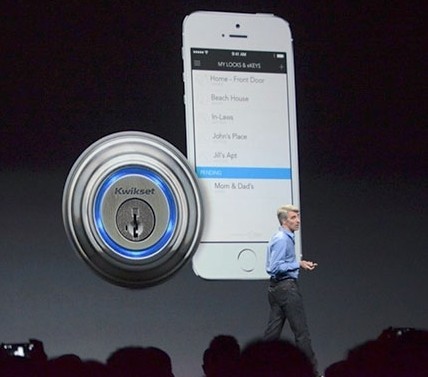Apple's pitch for the Internet of Things

At the Worldwide Developers Conference last week, Apple announced that it was adding two elements to its iOS 8 SDK - HomeKit and HealthKit - that will make the Internet of Things (IoT) much more prevalent in consumer culture
Why are they so important for the IoT?
Let’s start with the HomeKit, as it theoretically overcomes two things that have long been holding the ‘smart home’ movement back - simplicity and security.
Simplicity. In somewhat of a curve ball, Apple revealed that HomeKit will be a suite of tools built into its iOS SDK to enable developers of home automation products to unify their solution through a single platform.
Essentially, what this means is that instead of having several individual apps for your thermostat, security, lights and whatever else you decide to connect, they can all be controlled through one application. Think of this as turning your iPhone into a universal remote that can control every connected device in your home.
Security. When I think of a secure and robust eco-system, one of the first things I think of is Apple’s App Store and iOS. Apps with security flaws rarely get through the approval process and those that do get shut down pretty quickly.
As frustrating as it is at times, Apple is certainly one of the most consistent when it comes to patching and updating software, with security flaws rarely left open for long periods.
At the moment this is purely conjecture on my part, but I would be surprised if Apple didn’t apply the same high standards to applications being developed using HomeKit. This isn’t going to completely alleviate the concerns of a connected home being open to hacking but it certainly seems to be a step in the right direction.
This is an incredibly savvy move from Apple. The home automation market is still in a state of flux with no clear frontrunner in the hardware or software space. Enabling development rather than blunt force means Apple can essentially sit back and watch as a leader emerges, and then more than likely snap them up like they did with Beats Music.
Your health in their hands
Moving on to HealthKit, this is a very similar play to HomeKit in that it’s part of the iOS SDK and that it enables the collection and collation of data from multiple wireless health devices. These can be anything from activity trackers like FitBit to more pertinent diagnostic tools like blood pressure monitors.
However, HealthKit has its sights set on the bigger picture - remote diagnostics and accountability.
Remote diagnostics. Apple announced that it has established partnerships with the Mayo Clinic, which will be developing an app that will enable patients to share information with the clinic and their doctors, allowing for more proactive treatment.
As well as Mayo, Epic Systems is also on board. Epic Systems provides software suites to a range of hospitals - the company wants to use HealthKit to link patients to their hospitals and doctors through iPhones.
Accountability. Remote communications are already in place in some devices to help with accountability and insurance purposes - for example, a number of sleep apnoea devices have wireless modules to report back to the patient’s doctor. This isn’t just for diagnostics but also to ensure the patient is using the device properly.
Again, Apple can leverage its extensive and secure network to open up this data to health insurance providers if it’s so inclined, as well as sharing diagnostic information with doctors.
While these developments aren’t going to be responsible for an instant jump in connected devices, the immediate effects we are going to see are an increase in usability for existing devices and a more acute awareness of the Internet of Things from the general public.
Rethinking cyber defences in the age of continuous threat exposure management
Continuous threat exposure management turns compliance from a snapshot into an ongoing process of...
Building resilience with cybersecurity business intelligence
When it comes to cybersecurity, more spending doesn’t necessarily lead to better outcomes.
Driving data efficiency: three strategies for modern organisations
Achieving data efficiency is critical for sustaining organisational growth in the face of...




